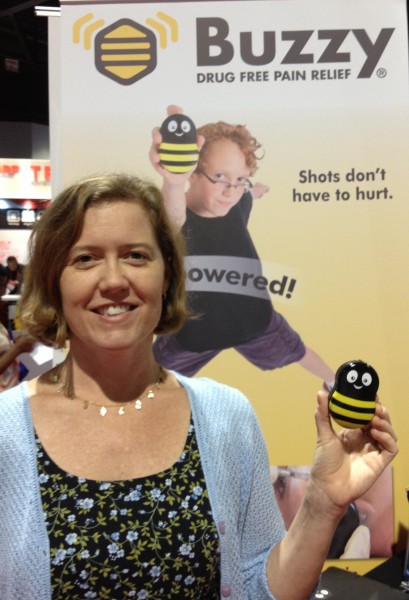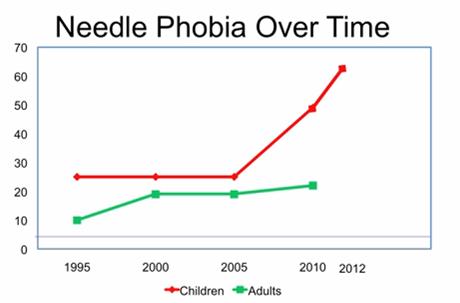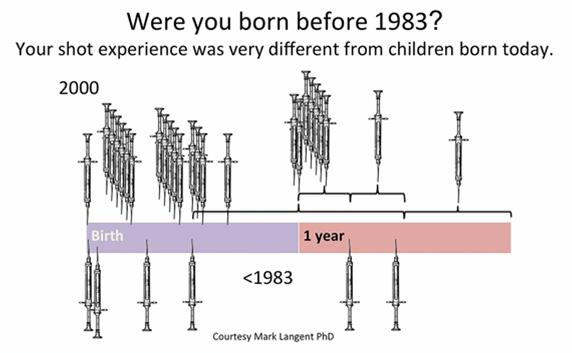Pediatrician’s Invention to Stop Pain of Injections Could Improve Public Health
/
Many parents bring their infants and young children to the doctor for injections and leave muttering “there’s got to be a better way,” their child in tears or traumatized by the shot – or shots – administered to prevent illness and disease. When Amy Baxter left the pediatrician’s office with her youngster, she resolved to find that better way.
Baxter, who attended Yale University as an undergraduate, Emory Medical School, and is now an emergency pediatrician, pain researcher and inventor in Atlanta, successfully developed - with financial support from the National Institute of Health – a game-changing device that combines high frequency, low amplitude vibration and a unique reusable ice pack a combination s pecifically designed to remove pain from the injection.
pecifically designed to remove pain from the injection.
By stimulating competing sensations, nerve transmission of sharp pain, itching, or burning is blocked. Simply put, the shots don’t hurt – and independently verified research indicates that it works.
As inventor of the unique needle pain blocking device - called Buzzy - Baxter founded a company that manufactures and distributes the product nationwide. It is now in 1,200 children’s and adult hospitals across the country, including Yale-New Haven Hospital, Connecticut Children’s Medical Center, and Lawrence & Memorial Hospital in New London, and it is being used in Connecticut, with varying frequency, by about 100 physicians in medical practices all across the state, from Ashford to Westport.
Buzzy is a bee-shaped palm sized device (wings included) that appears as cute as a toy but has a more important mission – to alleviate pain, thus eliminating the onset of fear. Baxter’s company, Georgia-based MMJ Labs, produces the fast, effective solution– which has applications beyond children, and beyond injections, to other ailments and sources of quick, sharp pain.
Since its launch in 2009, Buzzy has amassed more than 36,000 users, $1 million in annual revenue, and rapidly increasing s ales. Baxter is one of Inc. Magazine’s Top Women in Tech to Watch, and is asked all over the world to educate physicians, nurses, Child Life specialists, and others about the importance of pain management.
ales. Baxter is one of Inc. Magazine’s Top Women in Tech to Watch, and is asked all over the world to educate physicians, nurses, Child Life specialists, and others about the importance of pain management.
“I invented Buzzy after experiencing first-hand the indifference of the healthcare system to the pain and suffering of children. As a pediatric emergency physician and pain researcher, I have learned that pain relief is not just a luxury; it actually improves the outcomes of procedures,” Baxter explains.
Data indicates that fear of needles is growing among children and the general population, and Baxter says that’s reason for concern. Especially troubling is the long-term impact of a growing population o f needle-averse adults will have on their own health and the health care system.
f needle-averse adults will have on their own health and the health care system.
She cites statistics that reflect a dramatic increase in the number and frequency of shots children receive as youngsters – as much as four times higher than 50 years ago – and sometimes as many as four or five shots in a single doctor’s office visit. And she stresses that pediatricians generally do little or nothing to try to diminish the pain that accompanies those injections. That, Baxter says, has dramatic and long-lasting effects, on children as well as their parents. The youngsters come to view the visits as more about pain than health, and the parents begin to have second thoughts about continuing to inflict the pain of needles on their children, often regardless of the potential benefits.
In a TEDx talk in Atlanta last month, Baxter discussed the public health repercussions of having populations whose fear of vaccinations could turn them  away from the very remedies that can improve their individual health and the health of entire populations, warning that “by ignoring pain we’re endangering the future of health care.”
away from the very remedies that can improve their individual health and the health of entire populations, warning that “by ignoring pain we’re endangering the future of health care.”
In the talk, titled “Pain, Empathy and Public Health,” Baxter warned that “the number and the way were giving shots is causing needle fear” which may lead to today’s children electing to stay away or delay visits to doctor’s offices as adults – at considerable potential health peril.
In the face of a potential “public health tsunami,” Baxter says “the solution is not to stop vaccinating, it’s to start making the shots better— vaccines shouldn't have to hurt.”


 and others involved in software development, including graphic designers, interface designers and project managers, collaborate intensively on software projects.
and others involved in software development, including graphic designers, interface designers and project managers, collaborate intensively on software projects.
 e talented entrant. HTSQL is a Prometheus product.
e talented entrant. HTSQL is a Prometheus product.



























